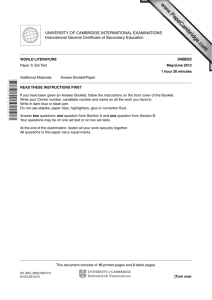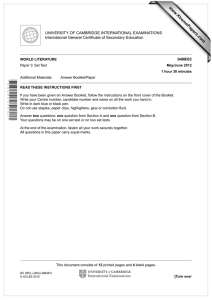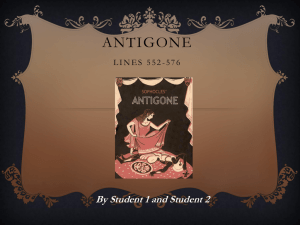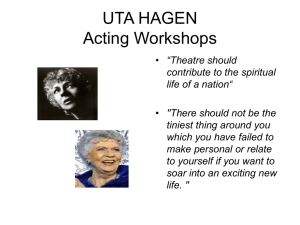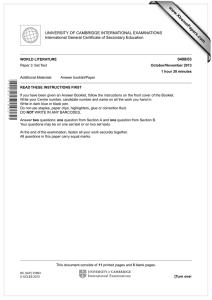www.XtremePapers.com Cambridge International Examinations 0408/03 Cambridge International General Certificate of Secondary Education
advertisement
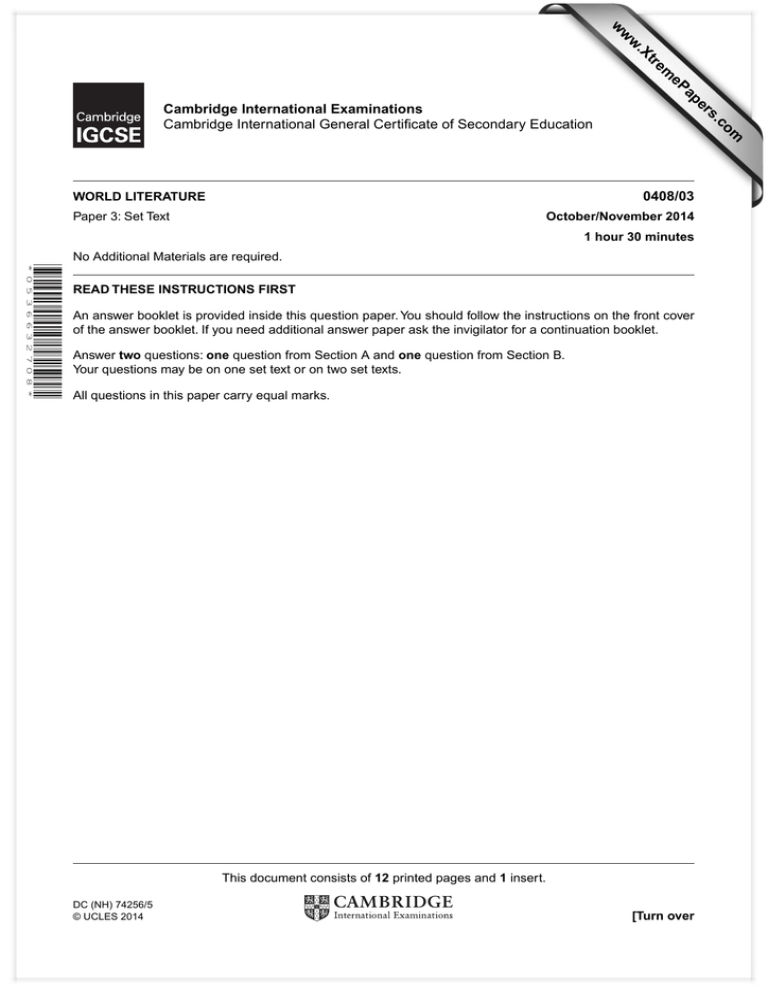
w w ap eP m e tr .X w om .c s er Cambridge International Examinations Cambridge International General Certificate of Secondary Education 0408/03 WORLD LITERATURE Paper 3: Set Text October/November 2014 1 hour 30 minutes No Additional Materials are required. * 0 5 3 6 6 3 2 7 0 8 * READ THESE INSTRUCTIONS FIRST An answer booklet is provided inside this question paper. You should follow the instructions on the front cover of the answer booklet. If you need additional answer paper ask the invigilator for a continuation booklet. Answer two questions: one question from Section A and one question from Section B. Your questions may be on one set text or on two set texts. All questions in this paper carry equal marks. This document consists of 12 printed pages and 1 insert. DC (NH) 74256/5 © UCLES 2014 [Turn over 2 SECTION A Answer one question from this section. Remember to support your ideas with details from the writing. JEAN ANOUILH: Antigone 1 Read this extract, and then answer the question that follows it: Ismene: Listen, Antigone. I’ve been thinking … Antigone: Yes …? Ismene: Turning it over in my mind all night … You’re mad. Antigone: That’s right. Ismene: We can’t do it! 5 Pause. Antigone: (in her usual quiet voice). Why not? Ismene: They’ll kill us! Antigone: Of course they will. Everyone has his part to play. Creon has to have us put to death, and we have to go and bury our brother. That’s how the cast-list was drawn up. What can we do about it? Ismene: I don’t want to die! Antigone: (quietly). I’d have preferred not to. Ismene: Listen. I’m older than you, and not so impulsive. You do the first thing that comes into your head, never mind whether it’s sensible or stupid. But I’m more level-headed. I think. Antigone: Sometimes it’s best not to think too much. Ismene: I disagree. It’s a horrible business, of course, and I feel sorry for Polynices too. But I do see Creon’s point of view. Antigone: I don’t want to see it. Ismene: He’s the king. He has to set an example. Antigone: But I’m not the king, and I don’t! Antigone, self-willed little beast, does the first thing that comes into her head! So then she’s stood in the corner or locked up in the dark. And serve her right! She should do as she’s told! 10 15 20 25 Ismene: That’s right! Scowl! Glare! Hold forth without letting anyone else get a word in edgeways! But listen to what I say. I’m right more often than you are. Antigone: I don’t want to be right! Ismene: At least try to understand! 30 Antigone: Understand! You’ve always been on at me about that, all of you, ever since I was little. I was supposed to understand I mustn’t play with water – beautiful, cool, elusive water – because it made the floor wet. Or with earth, because it dirtied my clothes. I was supposed to understand you mustn’t eat your cake before you’ve finished your bread and butter, or give all your pocket-money away to a beggar, or run in the wind till you drop, or drink when you’re hot, or go swimming just when you feel like it. Understand, understand, always understand! I don’t want to understand! I can do that when I’m old. (Softly.) If I ever am. 35 © UCLES 2014 0408/03/O/N/14 3 Ismene: He’s the king, Antigone. He’s stronger than we are. And everyone agrees with him. The streets of Thebes are full of them. Antigone: I’m not listening. Ismene: They’ll hiss and boo. They’ll seize us in their thousand arms, surround us with their thousand faces and their one expression, spit at us. And we’ll have to ride in the tumbril through their hatred, through their smell and their laughter to our execution. The guards will be waiting there, with their stupid faces all red from their stiff collars, their great clean hypocrites’ hands, their loutish stare. You can shout till you’re hoarse, trying to explain – they’ll do exactly as they’re told, slavishly, without knowing or caring whether it’s right or wrong. And the suffering, have you thought of that? We’ll have to suffer, feel the pain increasing, mounting up till it’s no longer bearable. It has to stop, but it goes on, climbing higher and higher like an ear-splitting shriek … I can’t! I can’t! Antigone: That’s what thinking does for you! Ismene: Haven’t you thought about it? Antigone: Yes, of course. Ismene: But I’m not brave. Antigone: (quietly). Neither am I. What’s that got to do with it? 40 45 50 55 Pause. Ismene: Don’t you want to live then? Antigone: (low). Not want to live … (Lower still if that’s possible.) Who used to be up first in the morning just to feel the chill air on her bare skin? Who used to go to bed last, and then only when she was ready to drop, just so as to live a little bit more of the night? Who used to cry, as a child, because there were so many insects and plants in the fields that it was impossible to collect them all? Ismene: 60 65 (suddenly drawn to her). Antigone … my pet … In what ways does Anouilh make this a powerfully dramatic moment in the play? © UCLES 2014 0408/03/O/N/14 [Turn over 4 ANITA DESAI: Games at Twilight and Other Stories 2 Read this extract from Pineapple Cake, and then answer the question that follows it: Here there was a repetition of the scene over the taxi: this time it was seats at a suitable table that Mrs Fernandez demanded, could not find, then spotted, was turned away from and, finally, led to two others by a slippery-smooth waiter used to such scenes. The tables had been arranged in the form of the letter E, and covered with white cloths. Little vases marched up the centres of the tables, sprouting stiff zinnias and limp periwinkles. The guests, chief and otherwise, seemed flustered by the arrangements, rustled about, making adjustments and readjustments, but the staff showed no such hesitations over protocol. They seated the party masterfully, had the tables laid out impeccably and, when the band swung into the ‘Do Re Mi’ song from The Sound of Music, brought in the wedding cake. Everyone craned to see Carmen Maria cut it, and Victor’s mother gave him a pinch that made him halfrise from his chair, whispering, ‘Stand up if you can’t see, man, stand up to see Carmen Maria cut the cake.’ There was a burst of laughter, applause and raucous congratulation with an undertone of ribaldry that unnerved Victor and made him sink down on his chair, already a bit sick. The band was playing a lively version of ‘I am Sixteen, Going on Seventeen’ when Victor heard a curious sound, as of a choked drain being forced. Others heard it too for suddenly chairs were being scraped back, people were standing up, some of them stepped backwards and nearly fell on top of Victor who hastily got off his chair. The mother of the bride, in her pink and silver gauzes, ran up, crying ‘Oh no, oh no, no, no!’ Two seats down sat the man with the long, thin neck in which an adam’s apple rose and fell so lugubriously. Only he was no longer sitting. He was sprawled over his chair, his head hanging over the back in a curiously unhinged way, as though dangling at the end of a rope. The woman in the purple net dress was leaning over him and screaming ‘Aub, Aub, my darling Aubrey! Help my darling Aubrey!’ Victor gave a shiver and stepped back and back till someone caught and held him. Someone ran past – perhaps one of those confident young waiters who knew all there was to know – shouting ‘Phone for a doctor, quick! Call Dr Patel,’ and then there was a long, ripping groan all the way down the tables which seemed to come from the woman in the purple net dress or perhaps from the bride’s mother, Victor could not tell – ‘Oh, why did it have to happen today ? Couldn’t he have gone into another day?’ Carmen Maria, the bride, began to sob frightenedly. After that someone grasped the long-necked old man by his knees and armpits and carried him away, his head and his shoes dangling like stuffed paper bags. The knot of guests around him loosened and came apart to make way for what was obviously a corpse. Dimly, Victor realized this. The screams and sobs of the party-dressed women underlined it. So did the slow, stunned way in which people rose from the table, scraped back their chairs and retreated to the balcony, shaking their heads and muttering, ‘An omen, I tell you, it must be an omen.’ Victor made a hesitant move towards the balcony – perhaps he would see the hearse arrive. But Victor’s mother was holding him by the arm and she gave it an excited tug. ‘Sit down, man,’ she whispered furtively, ‘here comes the pineapple cake,’ and, to his amazement, a plate of pastries was actually on the table now – iced, coloured and gay. ‘Take it, take the pineapple cake,’ she urged him, pushing him towards the plate, and when the boy didn’t move but stared down at the pastry dish as though it were the corpse on the red rexine sofa, her mouth gave an impatient twitch and she reached out to fork the pineapple cake onto her own plate. She ate it quickly. Wiping her mouth primly, she said, ‘I think we’d better go now.’ In what ways does Desai make this such a shocking and surprising ending to the story? © UCLES 2014 0408/03/O/N/14 5 10 15 20 25 30 35 40 45 5 Turn over for Question 3 © UCLES 2014 0408/03/O/N/14 [Turn over 6 ATHOL FUGARD: ‘Master Harold’ … and the Boys 3 Read this extract, and then answer the question that follows it: Sam: Okay. If that’s the way you want it, I’ll stop trying. (He turns away. This infuriates Hally even more) Hally: Good. Because what you’ve been trying to do is meddle in something you know nothing about. All that concerns you in here, Sam, is to try and do what you get paid for—keep the place clean and serve the customers. In plain words, just get on with your job. My mother is right. She’s always warning me about allowing you to get too familiar. Well, this time you’ve gone too far. It’s going to stop right now. 5 (No response from Sam) You’re only a servant in here, and don’t forget it. 10 (Still no response. Hally is trying hard to get one) And as far as my father is concerned, all you need to remember is that he is your boss. Sam: (Needled at last ) No, he isn’t. I get paid by your mother. Hally: Don’t argue with me, Sam! Sam: Then don’t say he’s my boss. Hally: He’s a white man and that’s good enough for you. Sam: I’ll try to forget you said that. Hally: Don’t! Because you won’t be doing me a favour if you do. I’m telling you to remember it. 15 20 (A pause. Sam pulls himself together and makes one last effort ) Sam: Hally, Hally … ! Come on now. Let’s stop before it’s too late. You’re right. We are on dangerous ground. If we’re not careful, somebody is going to get hurt. Hally: It won’t be me. Sam: Don’t be so sure. Hally: I don’t know what you’re talking about, Sam. Sam: Yes, you do. Hally: (Furious) Jesus, I wish you would stop trying to tell me what I do and what I don’t know. 25 30 (Sam gives up. He turns to Willie) Sam: Let’s finish up. Hally: Don’t turn your back on me! I haven’t finished talking. (He grabs Sam by the arm and tries to make him turn around. Sam reacts with a flash of anger) Sam: Don’t do that, Hally! (Facing the boy) All right, I’m listening. Well? What do you want to say to me? Hally: (Pause as Hally looks for something to say) To begin with, why don’t you also start calling me Master Harold, like Willie. Sam: Do you mean that? Hally: Why the hell do you think I said it? Sam: And if I don’t? © UCLES 2014 35 40 0408/03/O/N/14 7 Hally: You might just lose your job. Sam: (Quietly and very carefully) If you make me say it once, I’ll never call you anything else again. Hally: So? (The boy confronts the man) Is that meant to be a threat? Sam: Just telling you what will happen if you make me do that. You must decide what it means to you. Hally: Well, I have. It’s good news. Because that is exactly what Master Harold wants from now on. Think of it as a little lesson in respect, Sam, that’s long overdue, and I hope you remember it as well as you do your geography. I can tell you now that somebody who will be glad to hear I’ve finally given it to you will be my Dad. Yes! He agrees with my Mom. He’s always going on about it as well. “You must teach the boys to show you more respect, my son.” 45 50 55 How does Fugard’s writing make this such a disturbing moment in the play? © UCLES 2014 0408/03/O/N/14 [Turn over 8 HENRIK IBSEN: An Enemy of the People 4 Read this extract, and then answer the question that follows it: Dr. Stockmann: What next! Cantankerous, am I? Peter Stockmann: Yes, Thomas, you are an extremely cantankerous man to work with—I know that to my cost. You disregard everything that you ought to have consideration for. You seem completely to forget that it is me you have to thank for your appointment here as medical officer to the Baths. Dr. Stockmann: Peter Stockmann: I was entitled to it as a matter of course!—I and nobody else! I was the first person to see that the town could be made into a flourishing watering-place, and I was the only one who saw it at that time. I had to fight single-handed in support of the idea for many years; and I wrote and wrote— Undoubtedly. But things were not ripe for the scheme then— though, of course, you could not judge of that in your outof-the-way corner up north. But as soon as the opportune moment came I—and the others—took the matter into our hands. Dr. Stockmann: Yes, and made this mess of all my beautiful plan. It is pretty obvious now what clever fellows you were! Peter Stockmann: To my mind the whole thing only seems to mean that you are seeking another outlet for your combativeness. You want to pick a quarrel with your superiors—an old habit of yours. You cannot put up with any authority over you. You look askance at anyone who occupies a superior official position; you regard him as a personal enemy, and then any stick is good enough to beat him with. But now I have called your attention to the fact that the town’s interests are at stake—and, incidentally, my own too. And therefore, I must tell you, Thomas, that you will find me inexorable with regard to what I am about to require you to do. Dr. Stockmann: And what is that? Peter Stockmann: As you have been so indiscreet as to speak of this delicate matter to outsiders, despite the fact that you ought to have treated it as entirely official and confidential, it is obviously impossible to hush it up now. All sorts of rumours will get about directly, and everybody who has a grudge against us will take care to embellish these rumours. So it will be necessary for you to refute them publicly. 10 15 20 25 30 Dr. Stockmann: I! How? I don’t understand. Peter Stockmann: What we shall expect is that, after making further investigations, you will come to the conclusion that the matter is not by any means as dangerous or as critical as you imagined in the first instance. Dr. Stockmann: Oho!—so that is what you expect! Peter Stockmann: And, what is more, we shall expect you to make public profession of your confidence in the Committee and in their readiness to consider fully and conscientiously what steps may be necessary to remedy any possible defects. © UCLES 2014 5 0408/03/O/N/14 35 40 45 9 Dr. Stockmann: But you will never be able to do that by patching and tinkering at it—never! Take my word for it, Peter; I mean what I say, as deliberately and emphatically as possible. Peter Stockmann: As an officer under the Committee, you have no right to any individual opinion. Dr. Stockmann: (amazed ). No right? Peter Stockmann: In your official capacity, no. As a private person, it is quite another matter. But as a subordinate member of the staff of the Baths, you have no right to express any opinion which runs contrary to that of your superiors. Dr. Stockmann: This is too much! I, a doctor, a man of science, have no right to—! Peter Stockmann: The matter in hand is not simply a scientific one. It is a complicated matter, and has its economic as well as its technical side. Dr. Stockmann: I don’t care what it is! I intend to be free to express my opinion on any subject under the sun. Peter Stockmann: As you please—but not on any subject concerning the Baths. That we forbid. 50 55 60 65 Explore the ways in which Ibsen makes this such a dramatic moment in the play. © UCLES 2014 0408/03/O/N/14 [Turn over 10 Selection from Stories of Ourselves 5 Read this extract from Secrets, and then answer the question that follows it: He had been called to be there at the end. His Great Aunt Mary had been dying for some days now and the house was full of relatives. He had just left his girlfriend’s home – they had been studying for ‘A’ levels together – and had come back to the house to find all the lights spilling onto the lawn and a sense of purpose which had been absent from the last few days. He knelt at the bedroom door to join in the prayers. His knees were on the wooden threshold and he edged them forward onto the carpet. They had tried to wrap her fingers around a crucifix but they kept loosening. She lay low on the pillow and her face seemed to have shrunk by half since he had gone out earlier in the night. Her white hair was damped and pushed back from her forehead. She twisted her head from side to side, her eyes closed. The prayers chorused on, trying to cover the sound she was making deep in her throat. Someone said about her teeth and his mother leaned over her and said, ‘That’s the pet,’ and took her dentures from her mouth. The lower half of her face seemed to collapse. She half opened her eyes but could not raise her eyelids enough and showed only crescents of white. ‘Hail Mary full of grace …’ the prayers went on. He closed his hands over his face so that he would not have to look but smelt the trace of his girlfriend’s handcream from his hands. The noise, deep and guttural, that his aunt was making became intolerable to him. It was as if she were drowning. She had lost all the dignity he knew her to have. He got up from the floor and stepped between the others who were kneeling and went into her sitting-room off the same landing. He was trembling with anger or sorrow, he didn’t know which. He sat in the brightness of her big sitting-room at the oval table and waited for something to happen. On the table was a cut-glass vase of irises, dying because she had been in bed for over a week. He sat staring at them. They were withering from the tips inward, scrolling themselves delicately, brown and neat. Clearing up after themselves. He stared at them for a long time until he heard the sounds of women weeping from the next room. * His aunt had been small – her head on a level with his when she sat at her table – and she seemed to get smaller each year. Her skin fresh, her hair white and waved and always well washed. She wore no jewellery except a cameo ring on the third finger of her right hand and, around her neck, a gold locket on a chain. The white classical profile on the ring was almost worn through and had become translucent and indistinct. The boy had noticed the ring when she had read to him as a child. In the beginning fairy tales, then as he got older extracts from famous novels, Lorna Doone, Persuasion, Wuthering Heights and her favourite extract, because she read it so often, Pip’s meeting with Miss Havisham from Great Expectations. She would sit with him on her knee, her arms around him and holding the page flat with her hand. When he was bored he would interrupt her and ask about the ring. He loved hearing her tell of how her grandmother had given it to her as a brooch and she had had a ring made from it. He would try to count back to see how old it was. Had her grandmother got it from her grandmother? And if so what had she turned it into? She would nod her head from side to side and say, ‘How would I know a thing like that?’ keeping her place in the closed book with her finger. ‘Don’t be so inquisitive,’ she’d say. ‘Let’s see what happens next in the story.’ How does MacLaverty make this such a powerful introduction to the story? © UCLES 2014 0408/03/O/N/14 5 10 15 20 25 30 35 40 45 11 YUKIO MISHIMA: The Sound of Waves 6 Read this extract, and then answer the question that follows it: “I’ll do it,” he shouted clearly. “Good! Go ahead!” Shinji rose to his feet. He was ashamed of himself for the way he had been squatting on the deck until now, practically cowering. The wind came attacking out of the black reaches of the night, striking him full in the body, but to Shinji, accustomed to rough weather in a small fishing-boat, the heaving deck on which his feet were firmly planted was nothing but a stretch of earth that was frankly a bit out of sorts. He stood listening. The typhoon was directly above the boy’s gallant head. It was as right for Shinji to be invited to a seat at this banquet of madness as to a quiet and natural afternoon nap. Inside his raincoat the sweat was running so profusely that both his back and chest were drenched. He took the raincoat off and threw it aside. As he did so his barefoot figure, wearing a white T shirt, loomed through the blackness of the storm. Under the captain’s directions, the men tied one end of the lifeline to the bitts and the other end to the marline. Hindered by the wind, the operation progressed slowly. When the ropes were finally tied, the captain handed the free end of the marline to Shinji and yelled into his ear: “Tie this around your waist and swim for it! When you reach the buoy, haul the lifeline over and make it fast!” Shinji wrapped the marline twice around his waist above his belt. Then, standing in the bow, he stared down at the sea. Down beneath the spray, down beneath the whitecaps that beat themselves to pieces against the prow, there were the jetblack, invisible waves, twisting and coiling their bodies. They kept repeating their patternless movements, concealing their incoherent and perilous whims. No sooner would one seem about to come rising into sight than it would drop away to become a whirling, bottomless abyss again. At this point there flashed across Shinji’s mind the thought of Hatsue’s photograph in the inside pocket of his coat hanging in the crew’s quarters. But this idle thought was blown to bits upon the wind. He dived from the prow of the ship. The buoy was about twenty-five yards away. Despite his great physical strength, which he was confident would have to yield to none, and despite too his ability to swim around his home island five times without stopping, still it seemed impossible that these would suffice to get him across the immensity of those twenty-five yards. A terrible force was upon the boy’s arms; something like an invisible bludgeon belabored them as they tried to cut a way through the waves. In spite of himself, his body was tossed on the waves, and when he tried to bring his strength into opposition to the waves and grapple with them, his movements were as useless as though he were trying to run through grease. He would be certain that the buoy was finally within arm’s reach, and when he rose up out of the trough of the next wave he would look for it—and find it just as far away as ever. 5 10 15 20 25 30 35 40 How does Mishima’s writing make this such a dramatic climax to the novel? © UCLES 2014 0408/03/O/N/14 [Turn over 12 SECTION B Answer one question from this section. Remember to support your ideas with details from the writing. JEAN ANOUILH: Antigone 7 How does Anouilh’s use of the Chorus contribute to your understanding and enjoyment of the play? ANITA DESAI: Games at Twilight and Other Stories 8 Explore the ways in which Desai strikingly portrays the disintegrating relationship of David and Pat in Scholar and Gypsy. ATHOL FUGARD: ‘Master Harold’ … and the Boys 9 How does Fugard make ballroom dancing a memorable and significant aspect of the play? HENRIK IBSEN: An Enemy of the People 10 How far does Ibsen’s portrayal of Mrs Stockmann make you admire her? Selection from Stories of Ourselves 11 In Journey (by Patricia Grace), how does Grace make the old man’s journey so memorable for you? YUKIO MISHIMA: The Sound of Waves 12 What do you find so moving about Mishima’s portrayal of the love Shinji and Hatsue have for each other? Copyright Acknowledgements: Question 1 Question 2 Question 3 Question 5 Question 6 © Trans: Barbara Bray; Jean Anouilh; Antigone; Methuen Drama, an imprint of A&C Black Publishers. © Games at Twilight and Other Stories. Copyright © 1978 Anita Desai. Reproduced by permission of the author c/o Rogers, Coleridge & White Ltd., 20 Powis Mews, London W11 1JN. © ‘Master Harold’ … and the Boys; © 1982, Athol Fugard. Used by permission of Alfred A Knopf, a division of Random House, Inc. © ‘Secrets’ from SECRETS AND OTHER STORIES by Bernard MacLaverty, © Bernard MacLaverty. Reproduced by permission of the author c/o Rogers, Coleridge and White Ltd, 20 Powis Mews, London W11 1JN. © From The Sound of Waves by Yukio Mishima, published by Vintage Books. Reprinted by permission of The Random House Group Ltd. Permission to reproduce items where third-party owned material protected by copyright is included has been sought and cleared where possible. Every reasonable effort has been made by the publisher (UCLES) to trace copyright holders, but if any items requiring clearance have unwittingly been included, the publisher will be pleased to make amends at the earliest possible opportunity. Cambridge International Examinations is part of the Cambridge Assessment Group. Cambridge Assessment is the brand name of University of Cambridge Local Examinations Syndicate (UCLES), which is itself a department of the University of Cambridge. © UCLES 2014 0408/03/O/N/14
